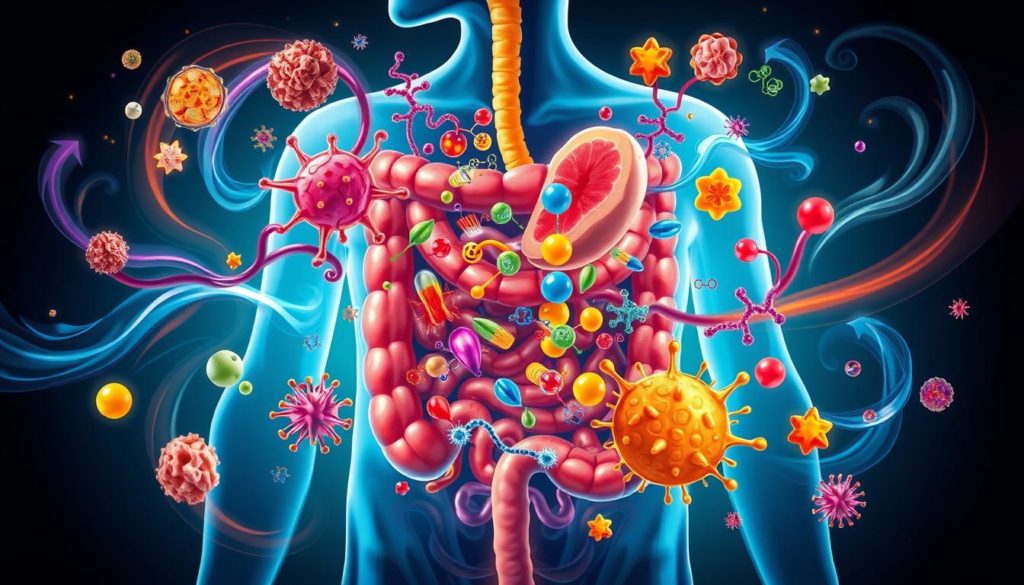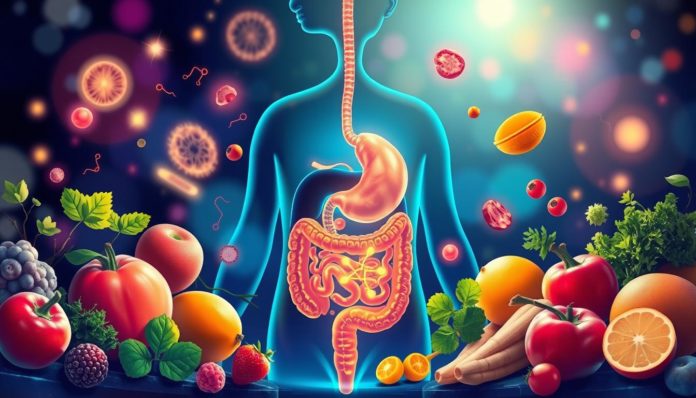Did you know almost 70 million Americans deal with digestive problems daily? This shows just how important good digestive health is. It’s often missed in the search for optimal health. At the core of this journey are digestive enzymes. These tiny workers break down what we eat, turning it into essential nutrients our bodies need.
Imagine not getting all the benefits from a nutrient-rich meal. That’s what happens without enough digestive enzymes. These enzymes are key in absorbing nutrients and improving gut health. They help keep our energy up and our immune system strong.
So, how do you ensure you have the best digestive enzymes for your body? It might be through diet or supplements. Finding the right balance could lead to better health and happiness. Let’s explore how digestive enzymes can boost your well-being.
What are Digestive Enzymes?
Digestive enzymes are key for breaking food down into nutrients we can use. They speed up chemical reactions that occur during digestion.

Role in Digestion
These enzymes are vital for digestion. They break down big molecules like carbs, proteins, and fats into smaller bits. For example, amylase targets carbs, protease goes after proteins, and lipase focuses on fats.
Types of Digestive Enzymes
There are many digestive enzymes, each with a specific job:
- Amylase: Breaks down carbohydrates into simple sugars.
- Protease: Aids in breaking down proteins into amino acids.
- Lipase: Helps digest fats into fatty acids and glycerol.
Sources of Digestive Enzymes
You can find digestive enzymes in lots of foods and supplements. Fruits like pineapple and papaya are packed with them. Yogurt and kefir, which are fermented, also offer beneficial enzymes. Plus, our bodies make them, mainly in the pancreas.
| Source | Type of Enzyme | Function |
|---|---|---|
| Pineapple | Bromelain | Protein digestion |
| Papaya | Papain | Protein digestion |
| Yogurt | Lactase | Carbohydrate digestion (lactose) |
| Human Body | Amylase, Protease, Lipase | Carbohydrates, Proteins, Fats digestion |
Benefits of Digestive Enzymes
Digestive enzymes do more than help with digestion. They make sure our bodies absorb nutrients well from our daily food. Knowing about these benefits is important for good health.

Improved Nutrient Absorption
Digestive enzymes play a key role in nutrient absorption. They break down food into simpler parts. This lets us absorb vitamins, minerals, and amino acids better, supporting our body’s functions.
Enhanced Gut Health
Digestive enzymes also boost gut health. They ensure food is fully digested. This prevents undigested food from causing problems in the intestines. A healthier gut means a happier life.
They keep the gut’s good bacteria in balance too. A balanced gut is crucial for staying healthy.
Reduced Digestive Discomfort
These enzymes make eating more pleasant by reducing digestive issues. They cut down on indigestion and heartburn. This makes everyday life more comfortable.
| Benefits of Digestive Enzymes | Details |
|---|---|
| Improved Nutrient Absorption | Enhanced absorption of vitamins, minerals, and amino acids. |
| Enhanced Gut Health | Prevents undigested food fermentation, reduces IBS risk. |
| Reduced Digestive Discomfort | Less bloating, indigestion, and heartburn. |
Natural Digestive Enzymes: The Basics
Learning about natural digestive enzymes is key for improving digestive health. These enzymes break down our food and are better than synthetic ones. They are also safer for us to use over time.
To boost our body’s enzyme production, our lifestyle and what we eat matter a lot. Eating whole food enzymes from fresh fruits, vegetables, and fermented foods helps. For instance, pineapple and papaya have bromelain and papain, which are important enzymes.
Here’s how natural and synthetic digestive enzymes differ:
| Natural Digestive Enzymes | Synthetic Enzymes | |
|---|---|---|
| Source | Derived from whole foods like fruits and vegetables | Manufactured in laboratories |
| Absorption | Easily absorbed by the body | Less efficient absorption |
| Safety | Generally safe for long-term use | May cause side effects |
Adding whole food enzymes to your diet helps your digestion and your overall health. By choosing natural sources, you make sure your body gets all the benefits. And you avoid the problems that synthetic enzymes might cause.
How Do Digestive Enzymes Work?
Digestive enzymes play a key role in our nutrition. They break down big food molecules into smaller ones that our body can absorb. This helps with our digestion.
They work together with stomach acids and other digestive parts. This teamwork is vital for a smooth digestion process.
Chemical Breakdown of Food
Digestive enzymes start working the moment we eat. Our saliva releases enzymes that begin breaking down food right away. This happens even before the food reaches our stomach.
There are specific enzymes for carbs, fats, and proteins. Amylase tackles carbs, lipase works on fats, and protease targets proteins. Each enzyme works best at different digestion stages, making sure food is properly broken down.
Interaction with Stomach Acids
Enzymes and stomach acids work hand in hand. The acids create an ideal environment for some enzymes to function well. This teamwork aids in breaking down food and activating enzymes.
This balance is essential for good digestion. It helps avoid problems like not absorbing nutrients well and digestive discomfort.
Choosing the Best Digestive Enzymes for You
Boosting your digestive health starts with the right digestive enzymes. Feeling confused about where to begin? This quick guide will help you find the digestive enzymes that fit your needs perfectly.
Assessing Your Needs
To pick the best digestive enzymes, you need to understand your health. Think about your digestive issues, eating habits, and any health problems. This will help you find the enzymes your body really needs.
Reading Labels
Labels on enzyme supplements can be tough, but they’re important to understand. Focus on the amount of enzyme activity, not just the weight. Make sure to check where each enzyme comes from to get high-quality ingredients. This helps you get the most from your digestive health supplements.
Consulting with a Healthcare Professional
Talking to a healthcare professional before starting enzymes is a smart move. They’ll give you advice that’s right for you. This makes sure the supplements are safe and work well, especially if you’re on other meds or have health issues.
Top Digestive Enzyme Brands in the Market
Picking from the top digestive enzyme brands can be a challenge due to many choices. We’ve gathered a list of popular enzyme supplements. These are selected for their effectiveness, customer reviews, and clear ingredient lists.
- Enzymedica – Digest Gold: Digest Gold is famous for its strength. People often praise it for boosting digestive health.
- Garden of Life – Raw Enzymes: This brand is favored for its raw, whole food ingredients. It’s a top pick for those wanting natural solutions.
- Source Naturals – Essential Enzymes: Known for its balanced mix, Source Naturals offers wide-ranging digestive support. It’s also reasonably priced, attracting excellent feedback.
- Now Foods – Super Enzymes: Combines many enzymes, like amylase, lipase, and protease. It’s effective against bloating and acid reflux.
- Pure Encapsulations – Digestive Enzymes Ultra: Valued for being hypoallergenic, this supplement suits sensitive people well. It’s well-received by those with special diet needs.
If digestive enzymes are low, one might face discomfort. While doctors may prescribe enzymes for severe cases, the brands listed above offer good relief. For more on how these supplements work and natural digestive health tips, click here.
Digestive Enzyme Supplements: Are They Necessary?
Some people really need digestive enzyme supplements, especially as they get older. This is because our bodies make fewer enzymes over time. When that happens, it can be harder to digest some foods.
If you have lactose intolerance, IBS, or chronic pancreatitis, these supplements could be very important. They help break down foods better. This means you can absorb nutrients better and feel less discomfort.
But not everyone agrees that taking these supplements is the best idea. Eating a diet full of natural enzymes from fresh fruits and veggies could be better. For example:
- Eating papaya and pineapple can increase your enzyme intake.
- Foods like kefir and sauerkraut are full of natural probiotics and enzymes.
- Activating the enzymes in nuts and seeds is as simple as soaking them.
Here’s a side-by-side view of taking supplements versus boosting your body’s enzymes naturally:
| Factor | Supplement Use | Encouraging Natural Enzyme Production |
|---|---|---|
| Convenience | Easy and Fast | Requires Dietary Adjustments |
| Long-term Health | Potential Over-reliance | Supports Overall Health |
| Cost | Can Be Expensive | Cost-effective |
In the end, whether you need digestive enzymes depends on your health and what you like. Always talk to a health pro to find the best path for your digestive well-being.
Incorporating Natural Digestive Enzymes into Your Diet
Adding natural digestive enzymes to your daily diet can greatly improve your gut health. These enzymes are crucial for breaking down food properly. They ensure you get the most out of your nutrients and aid digestion. By using supplements and eating foods rich in enzymes, you help your digestion system in a big way.
Foods Rich in Digestive Enzymes
Many foods are full of digestive enzymes and can be part of your meals. Pineapples, for example, are great because they have bromelain. This enzyme breaks down proteins. Papayas have papain, which also helps in digesting proteins.
Foods like kimchi, sauerkraut, and yogurt are packed with good enzymes. Mangoes, which have amylase, are good for starch digestion. Adding these foods to your diet helps your digestive health a lot.
Benefits of Whole Foods
Whole foods are not just good for their enzymes. They also have fiber, vitamins, and minerals that you don’t get from supplements. Fiber is good for your digestive system and overall gut health. Plus, whole foods help you eat a balanced diet. By choosing whole foods, you improve your gut health in a big way. To learn more about digestive enzymes, check this detailed blog post.
FAQ
What are digestive enzymes?
Digestive enzymes are special proteins that help break down food. They turn food into nutrients your body can use. They’re key for good digestion and overall health.
How do digestive enzymes work?
These enzymes work with stomach acids to simplify food. They break down carbs, proteins, and fats. This makes nutrients easier to absorb.
What are the different types of digestive enzymes?
Key digestive enzymes include amylase, protease, and lipase. Amylase targets carbs, protease breaks down proteins, and lipase works on fats.
What are natural sources of digestive enzymes?
Fruits like pineapples and papayas have these enzymes. Fermented foods like kimchi and yogurt are also good sources. Our bodies also make them.
What are the benefits of taking digestive enzyme supplements?
Digestive enzyme supplements boost nutrient absorption and gut health. They also help with bloating, gas, and indigestion.
How do I choose the best digestive enzymes for my needs?
Look at your health needs and read labels on supplements. Study the enzymes’ activity units and ingredients. Always talk to a doctor for advice.
Which are the top digestive enzyme brands on the market?
Top brands include Enzymedica, Thorne Research, and NOW Foods. They’re known for quality, transparency, and positive reviews.
Are digestive enzyme supplements really necessary?
They help with enzyme decline or certain health issues. But a balanced diet and healthy lifestyle also support natural enzyme production.
Can I get digestive enzymes from food?
Yes, you can. Pineapples, papayas, mangos, sauerkraut, and miso are rich in enzymes. Eating these foods can improve your digestion naturally.


